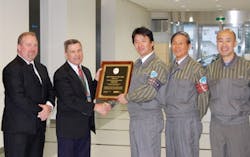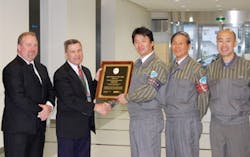HART Recognizes Mitsubishi Chemical
The HART Communication Foundation (www.hartcomm.org) selected the Mitsubishi Chemical ethylene plant located in Kashima, Japan, as recipient of the 2009 HART Plant of the Year Award. The award is given annually to recognize the people, companies and plant sites around the globe that use the advanced capabilities of HART Communication in real-time applications to improve operations, lower costs and increase availability. Mitsubishi is Japan’s largest chemical manufacturer.
Mitsubishi Chemical uses the HART capability of more than 800 interoperable field devices integrated with its DCS and asset management systems through multiplexers and HART-enabled I/Os to access real-time, continuous process variables and diagnostics. By accessing this real-time intelligent data, Mitsubishi can diagnose abnormal process conditions and track equipment health 24 hrs/day. As a result, peak production performance improved with an estimated operational savings for the plant of $20000-$30000 per day.
Diagnostics also are used to uncover device failures before they affect the process. It is estimated that two or three device failures have been detected that would otherwise have caused unplanned shutdowns. An unscheduled plant shutdown costs an estimated $600,000 in lost production value per day with a minimum production restart time of five days for a total savings of around $3 million.
"Diagnostic parameters that help detect signs of an abnormal situation or degrading performance are difficult to obtain with simple handheld devices because they require a time-consuming, manual, step-by-step approach," says Takayuki Aoyama, team leader, instrumentation group, Mitsubishi Chemical. "HART technology made it possible to access this data without manual operation. This made it much easier for us to gather data and detect abnormal situations from field devices and reduced maintenance costs by 10%."
In addition, trending and analysis of secondary process variables throughout the plant provide process insight that allows plant engineers to analyze, troubleshoot and resolve a number of operational problems including plugged impulse lines, an unstable flow profile and an inefficient compressor pump.
"We designated HART as our standard communication protocol, and will replace older devices with HART-type whenever we get a chance," says Takayuki. "We use HART communication to collect online data from our field devices without disturbing the 4-20 mA analog signal to the control system. Our goal is to detect abnormal situations in the process and protect field devices from malfunctions."
Mitsubishi Chemical is a perfect example of how the power of HART can be used to lower costs, improve plant availability and help keep a plant competitive, says Ron Helson, HART Communication Foundation’s executive director.
Mitsubishi Chemical, including subsidiaries, has 39000 employees. The ethylene plant capacity is 380000 tons/year. Approximately 800 HART devices are currently installed in the plant with an additional 2200 4-20 mA only devices that will be upgraded over time.
The HART Plant of the Year is presented to end-user companies to recognize ingenuity in the application of HART Communication technology. The award showcases end-user companies and their suppliers who have demonstrated creativity in using the full capabilities of HART Communication technology.


